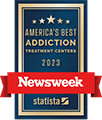Understanding Benzo Addiction
Benzodiazepines, a group of psychoactive substances, are often prescribed to those who are battling symptoms related to panic, anxiety, and insomnia. Known also as “benzos,” these substances are central nervous system depressants that are also used to treat those who have been afflicted with serious muscle pain or seizures, or those who require management for alcohol withdrawal syndrome.
Some examples of the most commonly prescribed medications that contain benzos include Klonopin (clonazepam), Ativan (lorazepam), Xanax (alprazolam), and Valium (which contains diazepam). The effects of these substances can include peacefulness, sedation, and relaxation. While these outcomes can be highly beneficial for those who are using them with the guidance of a medical professional, they are also attractive to those who desire to self-medicate and obtain an illicit high. The result of benzo abuse, no matter why it is being abused, can lead to extreme destruction within an individual’s life. Additionally, dependence can develop. The Diagnostic and Statistical Manual of Mental Disorders (DSM-5) states that dependence on benzos is known as sedative, hypnotic, or anxiolytic use disorder.
Fortunately, there are forms of treatment that can help those who were once dependent on benzos obtain the care they need to defeat their continued desire to abuse these substances and gain the tools needed to stay in recovery.
Statistics
Statistics of Benzo Abuse
Medications containing benzodiazepines are some of the most frequently prescribed medications in the country, with over 50 million prescriptions for these drugs being written each year. The National Center for Biotechnology and Information stated that a study of data collected from 2008 showed that 5.2% of American adults between the ages of 18 and 80 obtained a benzo prescription that year, with women obtaining them at twice the rate as men.
The Drug Abuse Warning Network (DAWN) states that over 30% of drug-related emergency room visits were linked to the abuse of benzodiazepines. According to the American Psychiatric Association (APA), the 12-month prevalence of sedative, hypnotic, or anxiolytic use disorder is 0.2% amongst adults within the country.
Causes & Risk Factors
Causes & Risk Factors of Benzo Abuse
An individual’s chances for abusing benzodiazepines or developing sedative, hypnotic, or anxiolytic use disorder can be determined by a number of factors, such as:
Genetic: The APA states that genetic factors make up some of the risk variance that an individual will have in the development of a sedative, hypnotic, or anxiolytic use disorder. This genetic disposition becomes more obvious as an individual goes from adolescence and into adulthood.
Environmental: A critical environmental risk for the abuse of and dependency upon benzos is availability and accessibility. Medications containing these substances are readily available throughout the country, meaning that these drugs can be obtained illegally through fraud or theft.
Risk Factors:
- Having alcohol use disorder
- Having access to benzodiazepines
- Impulsivity or novelty-seeking temperament
- Being female
- Early use of benzodiazepines
Signs & Symptoms
Signs & Symptoms of Benzo Abuse
Below are some of the many signs and symptoms that an individual might display if he or she is abusing benzodiazepines or has developed sedative, hypnotic, or anxiolytic use disorder:
Behavioral symptoms:
- Borrowing or stealing medications
- Withdrawing from family and friends
- Using prescribed medications contrary to the prescribing physician’s directions
- Visiting several doctors in an attempt to get multiple prescriptions
- Lying or being otherwise deceptive about activities
Physical symptoms:
- Irregular heartbeat
- Tremors in hands
- Coordination and motor skill problems
- Irregular breathing
- Blurry vision
- Slurred speech
Cognitive symptoms:
- Diminished inhibitions
- Paranoia
- Poor judgment
- Problems focusing or concentrating
- Retrograde amnesia
- Nightmares
- Confusion
Psychosocial symptoms:
- Depression
- Inability to experience pleasure
- Irritability
- Anxiety
- Mood swings
Effects
Effects of Benzodiazepine Abuse
Continued benzodiazepine abuse can cause a series of negative outcomes to develop, including:
- Suicidal ideation
- Suicide attempts
- Withdrawal and isolation
- Self-harm
- Legal problems, including arrest and incarceration
- Depression
- Problems with memory and concentration
- Confusion and disorientation
- Sleep disruptions
- Vision problems
- Poor job performance, possibly leading to job loss and chronic unemployment
- Financial distress
- Family discord, including separation or divorce
- Damaged or destroyed interpersonal relationships
Co-Occurring Disorders
Benzo Abuse & Co-Occurring Disorders
Those who have developed sedative, hypnotic, or anxiolytic use disorder that includes the use of benzodiazepines might also be at risk for experiencing the following co-occurring conditions:
- Schizophrenia
- Other substance use disorders
- Anxiety disorders
- Bipolar disorder
- Depressive disorders
- Posttraumatic stress disorder (PTSD)
Effects of Withdrawal & Overdose
Effects of Withdrawal & Overdose from Benzodiazepine
Effects of benzodiazepine withdrawal: When an individual finds him or herself dependent on a benzo, trying to stop use or curb it can bring about a number of upsetting withdrawal symptoms, such as:
- Agitation
- Suicidal ideation
- Strong drug cravings
- Sleep disturbances
- Vomiting
- Depression
- Irritability
- Heart palpitations
- Tinnitus
- Muscle pain
- Nausea
- Tremors
- Anxiety
- Panic
Effects of benzodiazepine overdose: When an individual consumes benzos in an amount that his or her body cannot handle, an overdose has occurred. Someone who shows the following symptoms after abusing benzos should obtain immediate medical help:
- Unconsciousness
- Coma
- Impaired balance and motor functions
- Double vision
- Hallucinations
- Delirium
- Respiratory distress
- Irregular heart rate, including cardiac arrest
- Dramatic drop in body temperature







